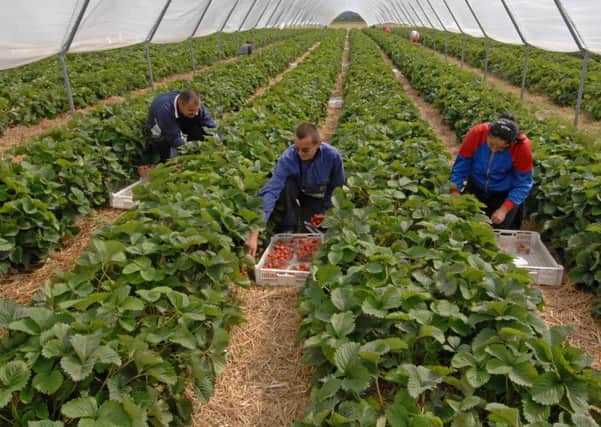Dorothy Fairburn: Farming needs workers from the EU


Achieving this goal on the road to a post-Brexit Britain is dependent on the agricultural sector’s continued access to a flexible, skilled and secure workforce, inclusive of both seasonal and permanent skilled workers.
And it is not just about food security. Our food and drinks industry in the UK employs 3.9m people, and adds nearly £27bn to our economy, so it is a very big deal which impacts on associated industries as well as consumers.
Advertisement
Hide AdAdvertisement
Hide AdThe CLA, which represents landowners, farmers and rural businesses, earlier this week told the Environment, Food and Rural Affairs (Efra) Select Committee inquiry that the sector would face reduced production and growth which could lead to increased food imports and prices if access to migrant labour is closed down post-Brexit.
Farming is dependent on workers from the EU, and eastern Europe in particular. There are more than 30,000 permanent workers (Office of National Statistics, 2015) and an estimated 67,000 seasonal workers (Migration Advisory Committee, 2012) working in agriculture who are of non-UK origin.
Having access to a pool of migrant labour is a requisite for being competitive in the global agri-food market, and the UK’s agricultural sector is not unique in this regard.
Italy allows 35,000 seasonal worker permits per year, and in Germany, 300,000 such workers are allowed annually, with 90 per cent coming from Poland.
Advertisement
Hide AdAdvertisement
Hide AdAs things stand, the rural economy is already at risk of a labour shortage. Apart from potential political restrictions on the seasonal and skilled labour from outside the UK after we leave the EU, a weaker pound has made working in the UK less attractive for migrant workers.
Implementing a new seasonal agricultural workers scheme should not be delayed until after we leave the EU.
A new scheme should allow migrants of both EU and non-EU countries to enter the UK for a set period of time and for a specific job vital to the needs of the rural economy but with no right to remain after their contract finishes.
In making our case, we are also pressing Government to confirm the status of EU migrant workers already resident in the UK working in sectors such as food production, horticulture and tourism. We want Government to provide a clear framework for allowing skilled workers to enter the UK labour market, with the potential to remain permanently.
Advertisement
Hide AdAdvertisement
Hide AdSkilled workers should be differentiated from seasonal workers, particularly as the former might bridge a skills gap within the rural sector on a longer term basis, especially where there is a defined need for such skills.
This is especially true for agricultural work that requires highly specialised technical skills, and those that further research and development within the sector.
The message is clear – farmers will fail to feed the nation successfully if migrant workers are excluded from vital jobs across the rural economy.
Dorothy Fairburn is the regional director for the CLA which in total represents 30,000 land, property and businesses owners in rural England and Wales.